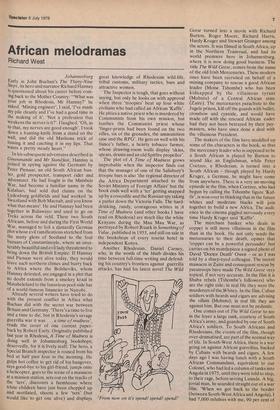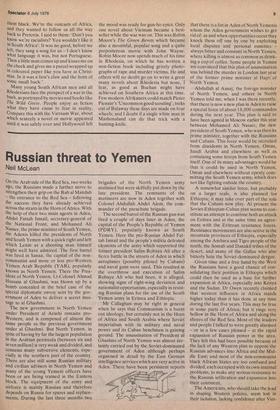African melodramas
Richard West
Johannesburg Early in John Buchan's The Thirty-Nine Steps, its hero and narrator Richard Hannay IS questioned about his career before coming back to the Mother Country: "What was Your job in Rhodesia, Mr Hannay?' he asked. `Mining engineer', I said, 'I've made my pile cleanly and I've had a good time in the making of it'. 'Not a profession that weakens the nerves is it?'. I laughed. 'Oh, as to that, my nerves are good enough'. I took down a hunting-knife from a stand on the wall, and did the old Mashona trick of tossing it and catching it in my lips. That wants a pretty steady heart."
In his subsequent adventures described in Greenman* and Mr Standfast, Hannay is Joined in spying against the Germans by Peter Pienaar, an old South African hunter, gold prospector, transport rider and adventurer. He had fought in the Matabele War, had become a familiar name in the Kalahari, had sold dud claims on the Lydenburg goldfields and had worked 'in Swaziland with Bob Macnab, and you know what that means'. He and Hannay had been together in Bulawayo and used to go on Treks across the veld. These two South Africans, before and during the First World War, managed to foil a dastardly German plot whose evil ramifications stretched from the misty glens of Scotland to the foul bazaars of Constantinople, where an unutterably beautiful and evil lady threatened to bring down the British Empire. If Hannay and Pienaar were alive today, they would leave such northern climes and hurry back to Africa where the Bolsheviks, whom Hannay detested, are engaged in a plot that no doubt extends from a smokey kraal in Matabeleland to the luxurious pool-side bar of a world-famous financier in Nairobi.
Already several writers have tried to do With the present conflict in Africa what Buchan did with the secret war between Britain and Germany. `There's a time to live and a time to die; but in Rhodesia's savage guerrilla war it was . . . a time of madness', reads the cover of one current paperback by Robert Early. Originally published last year in Rhodesia, A Time of Madness is doing well in Johannesburg bookshops; deservedly, for it is lively stuff. The hero, a Special Branch inspector is roused from his bed at half past four in the morning. He gulps hot coffee to get rid of his hangover, says good-bye to his girl-friend, jumps onto a helicopter, goes to the scene of a massacre at a mission station, sets out on the tracks of the lers', discovers a farmhouse where white children have just been chopped up and mutilated, shoots a few 'ters' (but would like to get one alive) and displays
great knowledge of Rhodesian wild-life, tribal customs, military tactics, bars and attractive women.
The Inspector is tough, that goes without saying, but only he looks on with approval when three `troopies' beat up four white civilians who had called an African 'Kaffir'. He pities a native priest who is murdered by Communists from his own mission, but loathes the Communist priest whose linger-prints had been found on the two rifles, six of the grenades, the ammunition case and the RPG'. He gets on well with his fiance's father, a hearty tobacco farmer, whose drawing-room Walls display 'skins, spears, drums and an old Spitfire propellor'.
The plot of A Time of Madness grows improbable when the inspector finds out that the manager of one of the Salisbury's troopie bars is also 'the regional director of the Africa Department attached to the Soviet Ministry of Foreign Affairs' but the book ends well with a 'ter' getting snapped up by a crocodile and the Russian spy taking a purler down the Victoria Falls. The harddrinking, randy, courageous whites in A Time of Madness (and other books I have read on Rhodesia) are much like the white Kenyans during the Mau Mau War, as portrayed by Robert Ruark in Something of Value, published in 1955, and still on sale in the bookshops of every tourist hotel in independent Kenya.
Another Rhodesian, Daniel Carney, who, in the words of the blurb divides his time between full-time writing and defending his country's frontiers against guerrilla attacks, has had his latest novel The Wild Geese turned into a movie with Richard Burton, Roger Moore, Richard Harris, Hardy Kruger and Stewart Granger among the actors. It was filmed in South Africa, up in the Northern Transvaal, and had its world premiere here in Johannesburg, where it is now doing good business. The title The Wild Geese, comes from the name
of the old Irish Mercenaries. These modern ones have been recruited on behalf of a mining company to rescue a good African leader (Moise Tshombe) who has been kidnapped by the villainous tyrant (Mobutu) of a Central African state (Zaire). The mercenaries parachute to the Jugele prison, kill off the guards with bullet, crossbow and cyanide, and would have made off with the rescued African eader had they not been betrayed by their paymasters, who have since done a deal with the villainous President.
The makers of the film have muddled up some of the characters in the book, so that the mercenary leader who is supposed to be a South African is played by Burton to sound like an Englishman, while Peter Coetzee, a Rhodesian, is turned into a South African — though played by Hardy Kruger, a German, he might have come from anywhere. There is a very un-moving episode in the film, when Coetzee, who had begun by calling the Tshombe figure 'Kaffir', is won over to thinking that in the future whites and moderate blacks will join together to build a new Africa. The audience in the cinema giggled nervously every time Hardy Kruger said 'Kaffir'.
The merchant banker who deals in copper is still more villainous in the film than in the book. He not only sends the mercenaries to their death, opines that 'copper can be a powerful persuader' but carries on his mantlepiece a signed photo of David `Doctor Death' Owen — or so I was told by a sharp-eyed colleague. The recent massacre in Zaire and consequent rescue by paratroops have made The Wild Geese very topical, if not very accurate. In the film it is Shaba rebels (Tshombe's followers) who are the right side; in real life they were the murderers of the Whitey. In the film, Cuban soldiers with beards and cigars are advising the villain (Mobutu); in real life they are against him. But one must not be pedantic.
One comes out of The Wild Geese to see in the foyer a large tank, courtesy of South Africa's army, and guarded by one of South Africa's soldiers. To South Africans and Rhodesians, the events of the film, though over-dramatised, are part of the normal way of life. In South-West Africa, there is a war going on against African guerrillas, backed by Cubans with beards and cigars. A few days ago I was having lunch with a South African Commandant, equivalent to our Colonel, who had led a column of tanks into Angola in 1975, until they were told to stop, to their rage, before seizing Luanda. A big, jovial man, he sounded straight out of a war film: 'When we got back to the border (between South-West Africa and Angola), I had 7,000 refufees with me, 90 per cent of
them black. We're the outcasts of Africa, and they wanted to follow us all the way back to Pretoria. I said to them: 'Don't you know we're racialists? You wouldn't like it in South Africa'. It was no good, before we left, they sang a song for us — I don't know what language it was, but not Portuguese. Then a little man comes up and kisses me on the cheek and gives me a parcel wrapped up in coloured paper like you have at Christmas. In it was a lion's claw and the horn of some small buck.'
Many young South African men and all Rhodesians face the prospect of a war in the bush, as portrayed by movies and books like The Wild Geese. People enjoy as fiction What they have cause to fear in reality. Compare this with the Vietnam War, about Which scarcely a novel or movie appeared until it was safely over and Hollywood felt the mood was ready for gun-ho epics. Only one novel about Vietnam became a bestseller while the war was on. This was Robin Moore's The Green Berets which became also a mournful, popular song and a quite preposterous movie with John Wayne. Robin Moore now spends much of his time in Rhodesia, on which he has written a non-fiction book including grizzly photographs of rape and murder victims. He and others will no doubt go on to write a great many novels about Rhodesia but none, I fear, as good as Buchan might have achieved on Southern Africa at this time. Few modern Afrikaners could match Pieter Pienaar's 'Uncommon good scouting'; treks out of Bulaway these days are made on four wheels; and I doubt if a single white man in Mashonaland can do that trick with a hunting-knife.



































 Previous page
Previous page